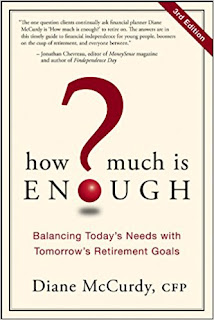Have you ever
had a song’s lyrics, playing over and over again, stuck in your head? During the holidays, I kept hearing these words
to “So
It is Christmas” so much so that I felt compelled to share its message
with you.
“So this is Christmas and what have you
done
Another year over, a new one just begun…”
Another year over, a new one just begun…”
“A very merry Christmas and a happy new
year
Let's hope it's a good one without any fears…”
Let's hope it's a good one without any fears…”
This time between Christmas and the New
Year can be an excellent time for reflection, to think about what we have done,
both good and bad. Since Santa keeps a
list of all the children who are naughty and nice, we could copy Santa’s
practise by keeping a list to see if we are naughty or nice with our
finances.
During the holidays, my brother-in-law
toasted to a year of “having enough”. In all seriousness isn’t that all we
need, “enough”? Diane McCurdy, a CERTIFIED
FINANCIAL PLANNER® professional, wrote the
book, How Much is Enough, and
created a list of twenty key strategies for making enough. We
could all take a lesson from her.
Here’s your assignment.
Read through the list below.
Reflect on what
you have done.
Plan to make enough.
And have a great 2018!
Twenty Key Strategies for Making Enough
- If you know what you want,
you can get it.
- It's never too late—or too
early—to start financial planning.
- A little is better than
nothing.
- Any interest you pay is
money you can't spend on yourself.
- Clearing up debt is
short-term pain for long-term gain.
- Make compound interest work
for you, not against you.
- Pay yourself first: take at
least 10% off the top to save and invest.
- Registered retirement plans
put more money in your hands and registered education plans put more money
in your children's hands.
- Revisit your wish list to
refocus on what you're aiming for.
- If you didn't want something
in the first place, it's not a deal no matter how cheap it is.
- Never hand over financial
control—no one else cares about your future the way you do.
- Get rich slowly—put your
money regularly into solid investments.
- Markets go up and down.
Don't panic.
- Invest only in things you
understand and feel comfortable with.
- If you miss an opportunity,
there will always be others.
- Borrow only for things that
appreciate in value (except for your first car).
- A financial advisor can make
sure you're making the most from your money.
- By taking care of yourself,
you're helping other people.
- Reward yourself in big and
little ways for staying on track.
- Know where you are on the road to where you're going.


















